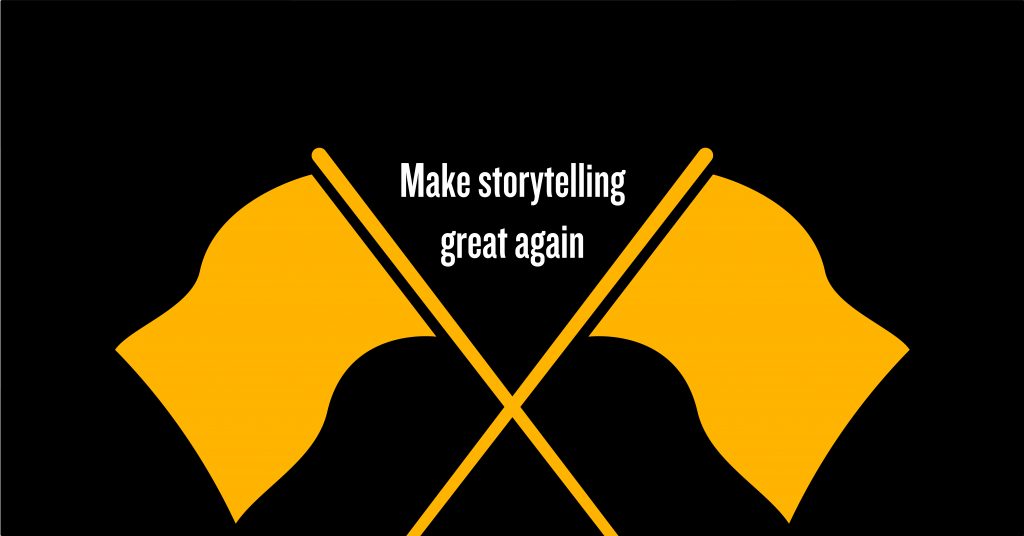Insight article

Storytelling your way to resilient teams and better business
A healthy business starts with healthy employees. Increasingly in the UK – where over half of all work absences in the UK are now due to work-related stress, anxiety or depression (HSE, 2018) – leaders know that healthy minds equal healthy balance sheets. But as we hear often from our clients, it’s a complex and confounding issue that many organisations lack the resource to adequately tackle.
At The Storytellers, we believe there is a simpler way to healthy, happy teams.
The stories we tell ourselves about ourselves determine the luck we have in our life. That was the finding of Professor Richard Wiseman in the early millennium after a decade of study into the felicitous and less-felicitous trajectories of various individuals. In so doing, Wiseman pioneered the first application of science to the field of personal development – an approach which has since spawned a growing global industry of professional and personal neuroscience that boasts varying levels of complexity and effectiveness.
Luck, he discovered, is a mindset. This mindset determines the ‘attentional spotlight’ we turn on the world. People who see themselves as unlucky live life in a state of high anxiety. When we feel anxious, we narrow our attentional spotlight, and we miss the wider opportunities, possibilities and connections available to us. Lucky people, armed with a larger attentional spotlight, as well as higher optimism, confidence and openness to the unknown, are quick to spot these opportunities, and confident enough to act on them. Luck, Wiseman stresses, is not the same as chance. No neuroscience will help you win big at the Casino. But luck – in terms of professional success and personal contentment – is largely up to us. By interpreting the world in a positive, ‘lucky’ light, we are creating a virtuous circle in our own lives.
Wiseman was one of the first to understand that by changing people’s mindset, you can give them the tools to change their outcomes. In today’s volatile context, his insights offer nothing less than the key to a resilience mindset – something we spend a great of time helping our clients cultivate in their teams. At its heart, this mindset comes down to story. ‘It’s the stories we tell ourselves about ourselves’, says Wiseman, ‘that really make the difference’. What’s more astonishing about the human mind, he continues, is that we have the power to tell ourselves different stories. ‘And by doing this, we can have a real impact on our happiness and success.’
At The Storytellers, these insights are core to our own approach. We know that humans are storytelling animals, hardwired to make sense of ourselves and the world through narrative. We know that mindset is the foundation of individual success, and that the narratives we form about ourselves are the most powerful determiner of how capable, open and optimistic we feel in the face of change and challenge – and therefore how resilient we are in today’s VUCA world. We know that resilient employees are the change makers and innovators of any organisation – which makes them the only true source of competitive advantage in today’s world.
We also know that these personal stories don’t occur through chance. They’re shaped by the cultural stories we experience throughout our lifetimes: the examples of success and failure from peers and role-models that help us form belief or negativity about our own outcomes. That’s why, alongside the compelling business-wide narratives we work with our clients to craft, we help leaders build resilient cultures with positive storytelling at their heart – broadening everyone’s attentional spotlight by celebrating attainable stories of success, impact and innovation.
These little stories have big impact – from reversing resignations, inspiring some pretty extraordinary acts of customer care, and fuelling innovation with huge cost savings (defect parts per million in one factory fell 73% within three months following our programme).
Looking forward, as mental health and wellbeing become ever more pressing issues in the workforce, Wiseman’s insights – and, we modestly believe, our own approach – continue to bear fruit for enlightened organisations looking for fresh ways to inspire, restore and fortify teams grappling with ever more uncertain and dynamic contexts.




